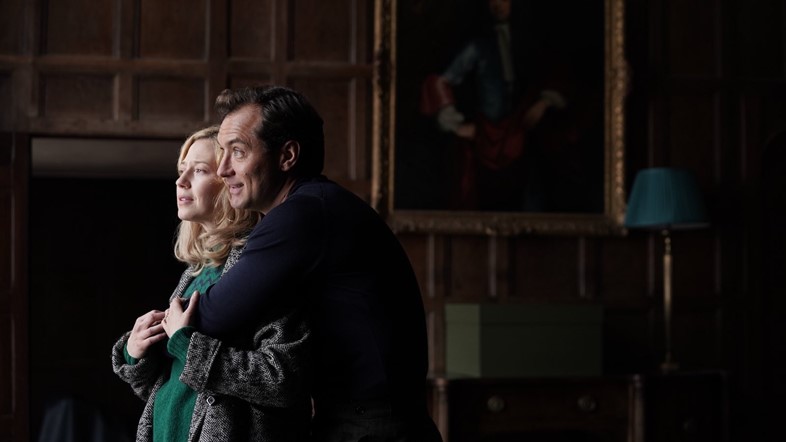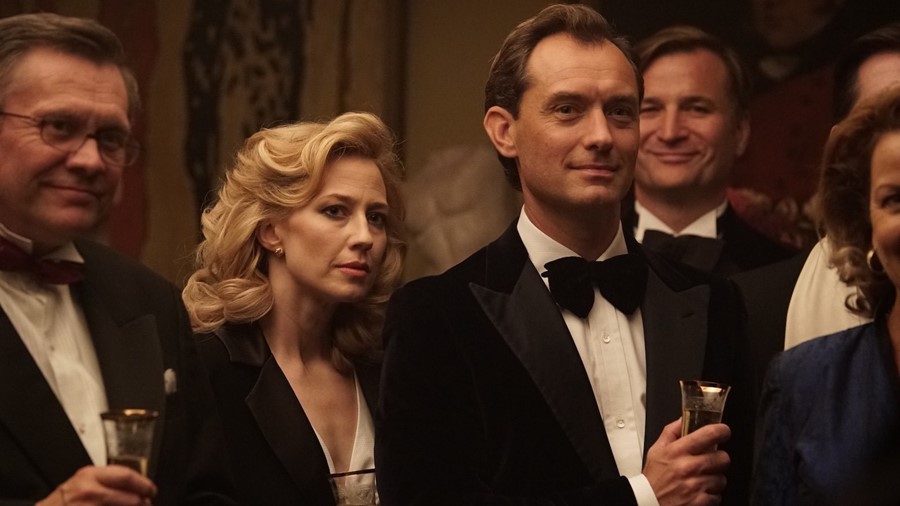After a 10 year break, the acclaimed Martha Marcy May Marlene director returns with a tense study of a collapsing marriage
“The first thing I said to my team was, people have too much fun making films about the 80s and they become ridiculous quickly,” writer-director Sean Durkin recalls of his objectives for The Nest, his second feature film after 2012’s Martha Marcy May Marlene. “When you’re living in it there’s nothing ridiculous, it’s just normal everyday life, so I wanted it to feel like normal everyday life; I wanted to embed the music for example, not have big montages over huge 80s songs. Visually too, I thought if we made it feel closer to now it would resonate more.”
Durkin’s vision of 1986 is designed with subtle but significant nods to the decade. There’s an NPR broadcast that speaks to the Big Bang moment of Rory O’Hara (Jude Law)’s financial industry, and a handful of carefully placed tracks from artists like Bronski Beat and This Mortal Coil. But the era never overwhelms the picture, nor does Durkin attempt to sell us nostalgia. Instead, The Nest reads as a tense family drama, with Rory and wife Allison (Carrie Coon) moving their two kids from New York to London as Rory’s career seemingly demands it. “It started with the idea of a family moving to England in the late 80s,” Durkin tells AnOther (his own family did the inverse in the early 90s). “I wanted to explore the effects the move across the Atlantic could have on a family. As I wrote, it became more focused on wanting to see a married couple who were complicated, at the same time perfect partners, attracted to each other, passionate and with a shared vision, but polar opposites.”

The couple’s volatile relationship – a provocative routine of lies and nasty insults – is gloriously depicted by Law and Coon. “Carrie I knew each other through friends,” Durkin explains, “and I really wanted to work with her. It was just her energy – she had this ferocity and this grounded midwestern energy which was entirely what Allison needed, and then also she could put on the fur coat and acrylic nails and you believe she wanted to do that, too.” Law’s attachment meanwhile was more uniform, with a script and a meeting. “I’ve been a fan of Jude’s for forever,” says Durkin, “and we wanted the same things from the character. Rory makes a lot of questionable decisions but he’s always operating in what he believes is in the best interests for his family. Jude is a very warm, loving person, and I knew if that heart was under the surface in everything Rory does, it would be really beneficial.”
Early on in the film, the family arrive at a mansion in Surrey. Mammoth in size and ridiculously sinister at over 700 years old, it’s also way over the family’s budget. “It’s an incredible place, beautiful but also massive – you can’t believe anyone lives there,” notes the director of the O’Hara’s British residence, a space that provides ample potential for the alarming scenarios the film’s score proposes. “You can see Rory’s vision for it, but it’s also absurd to move your family into a house that large. I wanted to create something with real space, so the family could be small in it, like they couldn’t quite fill the house, couldn’t close all the doors or feel safe. Idyllic but also a bit scary.”
Untitled for several years – Durkin began work on the story in 2012 – the film was so-named as a play on the definitions of a home. “It took time, but the core idea is about home and where we come from; about where we make a home and what nesting means,” he says, alluding to the connotations. “Nesting can mean something very nurturing and warm, but it can also be about insects and a creepy feeling. So the fact the word both works with genre as well as referring to home and place – it was what I wanted, to have both of those feelings.”
Notions of home and personal histories permeate the film, most notably in Rory who, following a modest and at least partially violent upbringing, has created a life based on pretending to be rich. After a devastating evening trying to impress some Norwegian fish farmers, he finds himself finally flirting with honesty as he’s dealt some hard truths in the back of a black cab. It’s a familiar scene, temporarily inspiring some optimism while ultimately inviting existentialism to the surface. “I’ve definitely had some incredible philosophical conversations with cabbies,” notes Durkin of the fleeting intimacy such moments present, “and it comes from that. Not getting direct life advice, but getting some quite beautiful philosophical life views from a total stranger. It just felt really believable, and actually after I’d written the scene, someone I knew read it and said that’d happened to them.”
The Nest is at UK cinemas from Friday 27 August.
